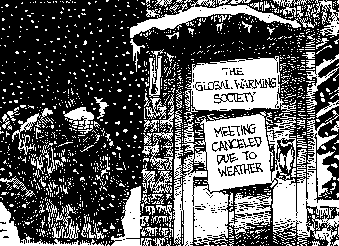Michael Fumento
Factual · Powerful · Original · Iconoclastic
Global Warming is the Scapegoat for Life's Chills.
January 01, 1996 · Michael Fumento · Climate changeThe theory of global warming is still unproven. The media claim that extremely cold winters indicate that global warming is occurring, but global warming would actually cause extremes in temperature to decrease.
What if the media told you that declining prices across the board were a sign that inflation again was rearing its ugly head? What if they told you that sharp drops in murder and assault rates nationally indicated that crime was on the upswing? Wouldn’t you be the least bit suspicious, even if you didn’t come from Missouri, the Show Me State?
That’s the sense you may have gotten lately in reading articles in the national media about how this incredible bun-freezing winter we’ve been having is evidence of global warming. When we have an especially hot summer, they say it’s global warming. Now that records for cold temperatures are snapping like so many icicles and the Northeast has just dug out of its worst blizzard in decades, we’re told that’s proof of global warming too. Ever heard the expression, "Heads, I win; tails, you lose"?

According to some environmentalists, this fellow may enjoy global warming.
But there it was, the cover of the Jan. 22 Newsweek: "Blizzards, floods & hurricanes: Blame global warming." There also was the New York Times front-page article by William K. Stevens headlined "Blame global warming for the blizzard" and a nationally syndicated article by environmentalist Jessica Matthews that ran under titles such as "Brrr, global warming brings our blizzard."
Not surprisingly, these writers have established careers as global-warming doomsayers. Stevens harps on it so incessantly as to practically put to shame the Roman senator Cato who insisted upon ending every speech with "Carthage must be destroyed."
Sure, sometimes counterintuitive things happen. That’s why somebody invented the term "paradox." But, doomsayers, the idea of warming causing freezing cold pushes that too far.
"There’s a silliness about attributing blizzards to global warming that’s just overwhelming," says Massachusetts Institute of Technology climatologist Richard Lindzen. "Were global warming to occur," he notes, "you would have reduced temperature variance." That’s because extreme cold comes from wind blowing down from the north. If the north and south poles warm the most, as global-warming climate models predict, the north would be far less likely to produce the kind of icy blasts it has sent to us these past few weeks.
But Lindzen adds, "The truth of the matter is the poles haven’t warmed and the storms we’re having now produce very cold weather because the climate has not behaved the way the models have said they should".
University of Virginia climatologist Pat Michaels agrees that extremes in temperature actually would decrease if the world grew warmer, from night to day and month to month. "The season-to-season extremes are decreasing," says Michaels.
Then how to explain this terrible cold weather if it’s not caused by warming? Hmmm, that’s a toughie. Could it be that, when it comes to the weather, the abnormal often is the norm? To borrow from one of the more vulgar expressions of the day: Bad weather happens.
But to global-warming enthusiasts, any and all aberrations are proof that the sky is falling. Thus, last year’s high number of dangerous hurricanes again was cited as proof of the warming effect. It made an encore on Newsweek’s Jan. 22 cover.
Yet according to a paper by eight prominent researchers in the November 1994 Bulletin of the American Meteorological Society, coastal inhabitants can rest easy. The researchers wrote, "Year-to-year variations" in weather "are so great that they must effectively swamp any quite modest effect" of global warming on hurricane frequency.
Global-warming enthusiasts desperately grasp at anything to prove their case. In early January, the Climatic Research Unit at England’s University of East Anglia made headlines, including the New York Times, with a preliminary report saying 1995 was the hottest year on record. But their data were for only 11 months. Rather than risk December’s temperatures spoiling everything, they jumped the gun and sent out their press releases.
Their fears were fulfilled when December’s average temperature came in at the lowest in 17 years. "It was a pretty ordinary year," said NASA scientist John Christy, who has been analyzing satellite data on temperature since 1979. And James Hansen of NASA’s Goddard Institute for Space Studies, who pretty much started the whole global-warming scare, admits his study of land areas — where the effects of global warming would be most severe — revealed that 1995 was about 0.02 degrees celsius cooler than 1990.
In short, the theory of global warming continues to be just that — an unproved theory And even were it valid, the theory couldn’t explain blizzards and cold snaps.
And where does this weather unfit for man or polar bear leave global-warming skeptics? Just as they always have claimed that an exceptionally hot summer doesn’t prove global warming, they now cannot claim that an exceptionally cold winter disproves it. And they haven’t. I’ve yet to hear any global-warming skeptic make such a claim.
Global-warming doomsayers have had similar opportunities for honesty. Instead, the likes of Stevens and Matthews went for sensational headlines. To them, any well-publicized weather story is an opportunity to promote their pet theory.
No, the theory of global warming hasn’t been disproved. But clearly some of its more fervent enthusiasts need to step back, look at the evidence and chill out.

